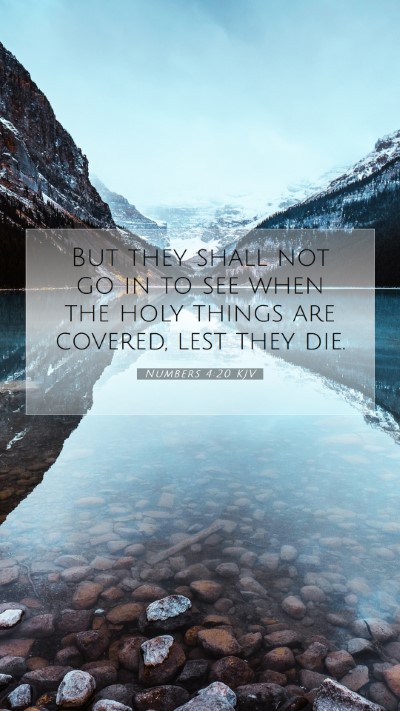Understanding Numbers 4:20: Meaning and Interpretation
The verse Numbers 4:20 states:
"But they shall not go in to see when the holy things are covered, lest they die."
This verse reflects a significant aspect of the rituals and responsibilities of the Levitical priesthood in the Old Testament. The contents and the holiness of the tabernacle were treated with utmost reverence, necessitating strict guidelines regarding who could approach and under what circumstances.
Background and Context
To fully grasp the meaning of Numbers 4:20, it is vital to examine its historical and theological context:
- Levitical Duties: The Levites were assigned specific roles in the maintenance of the tabernacle, particularly during its transport.
- Holiness of Sacred Items: The items within the tabernacle, such as the Ark of the Covenant, were considered extremely holy.
- Consequences of Irreverence: Being in proximity to the holy items without proper authorization could result in severe consequences, including death.
Interpretation from Public Domain Commentaries
Commentaries by Matthew Henry, Albert Barnes, and Adam Clarke provide invaluable insights into this verse:
Matthew Henry's Commentary
Matthew Henry emphasizes the importance of the holiness of God and the sacredness of the items in the tabernacle. He notes that this strict regulation served to remind the Israelites of the gravity of approaching God and the need for reverence. The warning against seeing the holy things suggests an intertwining of divine presence with sacred spaces.
Albert Barnes' Notes
Albert Barnes highlights the consequences of viewing the holy things in an unauthorized manner. He explains that God’s holiness cannot be taken lightly, and such severe restrictions were meant to protect both the people and the integrity of the worship practices. Barnes points out that this was part of God's overarching plan to maintain a clear boundary between the sacred and the profane.
Adam Clarke's Commentary
Adam Clarke provides an analysis of the ritualistic practices surrounding the tabernacle. He notes that the specific instruction for the Levites encapsulated their protective role over the sacred items, serving as guardians of the holy. Clarke also emphasizes that these precautions exemplify God’s desire for order and sanctity in worship.
Theological Implications
This verse invites readers to contemplate several theological implications:
- God’s Holiness: The need for boundaries when approaching God underscores His divine holiness and the reverence due to Him.
- Role of Mediators: The Levites acted as mediators between God and the people, highlighting the necessity of intercession in approaching the divine.
- Lessons for Worship: Modern worship practices can draw insights regarding the importance of reverence and preparation in approaching God.
Practical Applications
Understanding Numbers 4:20 can lead to pertinent applications in various aspects of life:
- Reverence in Worship: Maintaining a sense of awe and respect during worship can deepen one’s spiritual experience.
- Recognizing Boundaries: Understanding the need for boundaries in spiritual matters encourages respectful approaches to sacred practices.
- Role of Responsibility: Like the Levites, individuals today can embrace roles that protect and honor the sanctity of spiritual practices.
Cross References
Several other Bible verses relate closely to Numbers 4:20, providing further insight into the themes of holiness and reverence:
- Exodus 19:12-13: Instructions on boundaries around Mount Sinai during God’s revelation.
- Leviticus 10:1-3: The story of Nadab and Abihu, illustrating the seriousness of approaching God improperly.
- Hebrews 12:28-29: A New Testament reflection on how to worship God acceptably with reverence and awe.


